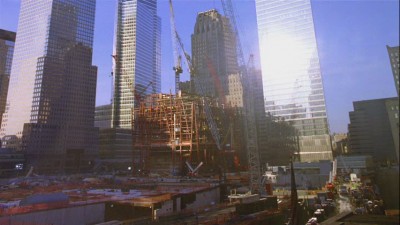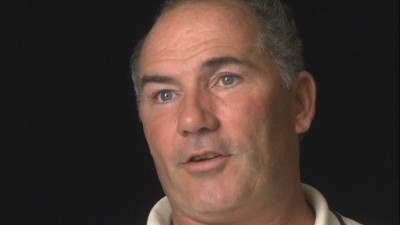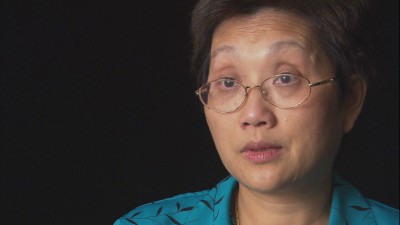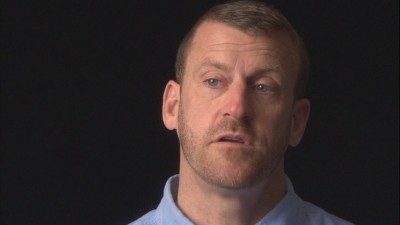| Reviews & Columns |
|
Reviews DVD TV on DVD Blu-ray 4K UHD International DVDs In Theaters Reviews by Studio Video Games Features Collector Series DVDs Easter Egg Database Interviews DVD Talk Radio Feature Articles Columns Anime Talk DVD Savant Horror DVDs The M.O.D. Squad Art House HD Talk Silent DVD
|
DVD Talk Forum |
|
|
| Resources |
|
DVD Price Search Customer Service #'s RCE Info Links |
|
Columns
|
|
|
Rebirth

The phrase "human interest story" has some negative connotations: it brings to mind soft, banal news at best, gawking exploitation at worst. Make it a human interest story about 9/11, and it would seem you were really asking for trouble. Yet Jim Whitaker's documentary Rebirth, a film made under the auspices of the post-9/11 nonprofit organization Project Rebirth, is just that, and it manages at the same time to be a respectful, compassionate, moving chronicle of the post-devastation lives of five individuals directly affected by the World Trade Center attacks. Instead of bowing to the interests of untroubling accessibility or entertainment value by boiling down and trivializing the sometimes knotty unpleasantness of lives struck by tragedy, as the human-interest angle seems so prone to doing, it actually has the patience and empathy to allow the experiences of its interviewees to become something more expansive, the complexities of which we are offered insight into, and the ultimate hopefulness of which is hard-earned and real.

Shortly after the events of September 11, 2001, Whitaker interviewed five disparate victims: Tanya Villanueva, a woman in her mid-30s who lost her fiancé in the attacks; Tim Brown, a firefighter whose brother-like mentor was killed in the line of duty; Nicholas Chirls, a boy in his late teens whose mother was working in the WTC and killed when the planes hit; Ling Young, a Chinese-American woman who was also working in one of the buildings when the attacks began, but survived; and Brian Lyons, a construction worker whose work rebuilding Ground Zero began that horrible day. Each year since, around the anniversary of the attacks, Whitaker and cinematographer Thomas Lappin have had the interviewees return to the same room and describe the ongoing process of rebuilding their lives after such high-impact trauma and loss, with the filmmakers also covering the various annual 9/11 memorial ceremonies in which they take part. In addition, Lappin set up over a dozen time-lapse cameras around the former WTC site and kept them going 24/7 in the years since the attacks, recording for selective use in the film every moment of Ground Zero's decade-long evolution into the current "Freedom Tower."

These elements are all woven together into a story that, while it does follow a sort of predetermined chronology, maintains a wonderfully honest unpredictability; as in Michael Apted's 7 Up series, there is no telling what will happen to these very different individuals--what turns their lives, personalities, and coping mechanisms will take from year to year. Villanueva, emotionally the most directly expressive of the group, copes with survivor guilt as she reluctantly contemplates finding another mate and pursuing her desire to have children. Ling, who suffered severe injuries in the attacks, undergoes constant surgeries with never-ending complications and revisions, yet miraculously maintains a pragmatic sense of humor, finding comfort at her worst moments of frustrated, bedridden desperation in Murder, She Wrote reruns (a fact whose simultaneous humorous incongruity and strange appropriateness she is quite cheerfully aware of). Chirls, initially the most angry-seeming among the interviewees, has to endure the always-complicated journey of late adolescence into early young adulthood coping with the loss of his mother and his consequently strained relationship with his father, whose remarriage he feels is too hasty. Lyons, who seems the most affectless on the surface in the first round of interviews, later develops post-traumatic stress disorder, which jeopardizes his marriage and work relationships; Brown tries to put the devastating loss of his friend behind him with a move to Washington, D.C. and an impassioned involvement in Rudy Giuliani's unsuccessful 2008 presidential campaign.

Strategically interspersed with the interviews (which the filmmakers made the very astute decision to film in a stripped-down black-background style reminiscent of Warren Beatty's similar visual approach in Reds) is sped-up time-lapse footage of Ground Zero during its long-delayed post-9/11 development; this and other portions of the film are accompanied by Phillip Glass's score, recalling the also Glass-score-centered, time-lapse-heavy quatsi films of Godfrey Reggio. There are a few obvious, mawkish moments that slightly dilute the film's direct, clear, unsentimental but very emotionally attuned power. (It is high time to retire covers of Leonard Cohen's majestic but overused "Hallelujah" as the designated, official default song to tack onto your montage in an attempt to add instant profundity.) But Whitaker and Lappin never push into obviousness the analogy of the site's slow recovery with the various forms of "rebirth," or at least attempts at such, of Villanueva, Chirls, Ling, Brown, and Lyons. They don't need to; with all the astoundingly raw, candid recollections and revelations fearlessly provided by the interviewees alongside the exhilarating, beautiful shots of the physical recovery of a maimed city (this resonates in particular with the very long process of Young's wounds healing), Rebirth's title does ultimately take on a multilayered meaningfulness that belies its apparent simplicity.

THE DVD:
The anamorphic transfer, in a widescreen aspect ratio of 1.78:1, is excellent. The skin tones and contrasts of the interview portions are remarkably cinematic-looking on the home screen, with none of the flicker or other compression artifacting that the sort of wall-of-black background used for the interviews can invite; and every stunning pixel of the outdoor time-lapse footage is brilliantly pure, with every color coming through perfectly.
Sound:Either of the film's soundtracks (Dolby Digital 2.0 stereo or Dolby Digital 5.1 surround) is sonorous, crystal-clear, and speaker-filling without any distortion or tinniness, with Glass's rich score coming through especially powerfully, of course, on the 5.1 option.

A feature-length commentary by director Whitaker and cinematographer Lappin confirms the filmmaking duo's sensitivity and intelligence, and offers some illuminating insights into the obviously very exacting and work-intensive process of shooting and structuring a film like Rebirth, which also represents an unusually long-term commitment for any filmmaker. This is not the kind of film that needs too much commenting upon, though, and the entire commentary at once can feel a bit redundant at times; still, it is well worth a listen, if only in installments.
A second disc contains a very short film documenting Lappin's process of building special, insulated housings for the project's time-lapse cameras and other interesting technical planning and decision-making that had to be made in order to keep Ground Zero constantly captured on film over the course of years. Also on disc 2 is a feature-length rough cut featuring only the film's more external components (the crowded ceremonies and time-lapse footage); this is often pretty to look at, but its interest does not hold for nearly 90 minutes, and watching it really just serves to reinforce how indispensable the intimacy of the interviews is to complementing and contextualizing the bigger picture in the film's final version.
Oscilloscope's DVD release of Rebirth also includes a handful of trailers for other Oscilloscope releases, as well as the studio's standard, very elegant, well-designed packaging, which features a brief essay on the film by documentarian Davis Guggenheim (An Inconvenient Truth).
FINAL THOUGHTS:Rebirth may not technically be much more than a PSA/educational tool created to aid the development of the worthy Project Rebirth, but you have never in your life been this moved by any public-service or educational production. Director and project director Jim Whitaker brings a fine, circumspect but unflinching tone to the candid memories and musings of the five 9/11 survivors the film documents, always keeping well clear of mere passive voyeurism or wallowing. This is no more an arbitrarily feel-bad movie than it is an anodyne feel-good picture, but rather one that encompasses the frightening lows and hard-won, conditional triumphs of the long and tortuous path of loss and grief. With so many commemorations of questionable taste on offer to "honor" the 10-year anniversary (even that word seems tacky and insufficient to the magnitude) of 9/11, you could do infinitely worse than this sober, very intelligent and very sensitive tribute to peoples' ability to survive and cope. Recommended.
|
| Popular Reviews |
| Sponsored Links |
|
|
| Sponsored Links |
|
|
| Release List | Reviews | Shop | Newsletter | Forum | DVD Giveaways | Blu-Ray | Advertise |
|
Copyright 2024 DVDTalk.com All Rights Reserved. Legal Info, Privacy Policy, Terms of Use,
Manage Preferences,
Your Privacy Choices | |||||||














